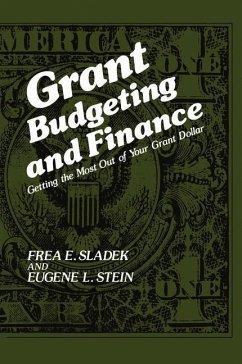
Grant Budgeting and Finance
Getting the Most Out of Your Grant Dollar

PAYBACK Punkte
20 °P sammeln!
Do you work for an organization that depends on receiving grant funds for sur vival? Do you work for one that gives grants? Have you been in the grants busi ness a long time? Or a relatively short time? Do you plan to work for a grant giving or grant-receiving organization? If you answered "Yes" to any of these questions, this book is written for you. It will save you money. You will share in professional secrets that, up until now, have not been in print. You will find out more about the roles that others play in the grant-spending process; thus you will have an advantage in dealing with othe...
Do you work for an organization that depends on receiving grant funds for sur vival? Do you work for one that gives grants? Have you been in the grants busi ness a long time? Or a relatively short time? Do you plan to work for a grant giving or grant-receiving organization? If you answered "Yes" to any of these questions, this book is written for you. It will save you money. You will share in professional secrets that, up until now, have not been in print. You will find out more about the roles that others play in the grant-spending process; thus you will have an advantage in dealing with others. You will receive tips for spending grant dollars effectively and will be alerted to obstacles that may prevent you from maximizing grant funds. "Grants programs should be run more efficiently, cut out the organizational 'fat,' and develop better management techniques," a trustee of the Rosenberg Foundation was quoted as saying in the Foundation News recently. In this same issue, a leaderof the Alcoholism Center for Women in Los Angeles told of trim ming superfluous grant spending across the board. "We want to provide the same services," she stated. "We're cutting the fat. " The topic of the article was Cali fornia's Proposition 13 and its impact on nonprofit organizations that depend on grant funds for their survival. (l) Not only are taxpayers revolting nationwide against paying ever-increasing taxes, but Congressmen are apparently listening.














